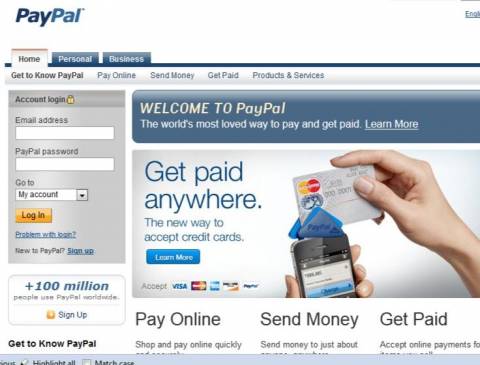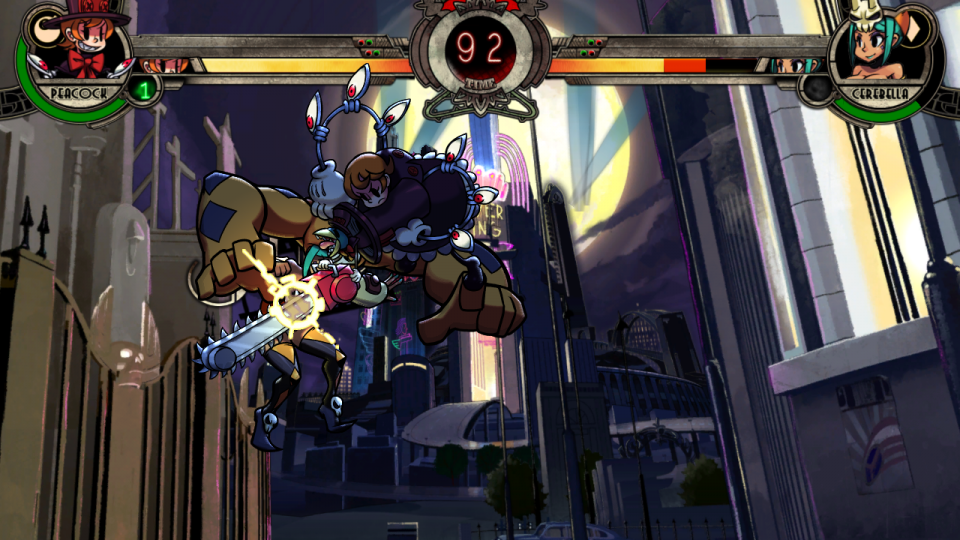For the past six years, three ex-SNK fighting veterans have been toiling away at their own independent fighting game, Yatagarasu: Attack on Cataclysm. Hoping to expand, the team turned to Indiegogo and asked for $68,000. Fans rewarded them with enough enthusiasm to raise $118, 243, nearly twice the original goal.

Then, the money disappeared. PayPal, which handles transactions between creators and fans on Indiegogo, locked down the developer’s account, and said it could only have 50% of the funds. The rest would be released as development continued, based on PayPal’s assessment of the situation. PayPal was, essentially, going to become a producer on Yatagarasu going forward.
“This has nothing to do with payment processing,” said Nyu Media founder Seon King, one of the project leads. “And they’re kind of allowing themselves to join the project in a policing role where we become accountable to them. That was really ridiculous to read, to have to consider.”
Millions upon millions have been raised by game fans, and with FTL and Shadowrun Returns proving it can work, there’s few signs this new funding mechanism is going anywhere. If anything, we can expect more players to get involved. But the money is a pretty key component.
At the heart of the problem is PayPal, the eBay-owned financial transaction service that’s become one of the most ubiquitous mainstays on the Internet. Most sites these days offer PayPal payment options, so it’s impossible to avoid, forcing PayPal’s structural problems to the surface over and over again.
Just recently, PayPal president David Marcus posted a blog talking about how the company’s focus on global expansion “had taken precedence over our customers’ experiences for too long,” and it was launching a “Customer First” initiative. When you have to launch a program called “Customer First,” you have a problem.
King had been receiving emails from PayPal daily--more than 7,000--as fans contributed to the project. He’d started to zone them out. Two of those emails were notifications about the account status, but King didn’t find them until after discovering the account had been locked, a move that did not occur until after funding had closed and Yatagarasu had been promised to backers. PayPal asked King for information about his company, the game, and other details to establish legitimacy, which PayPal accepted. But the account was still locked, with PayPal asserting it would dole out funds for Yatagarasu as the months went on.
Yatagarasu was not the first to encounter the problem, and wasn’t even alone in dealing with the problem that week. Months prior, Skullgirls developer Lab Zero Games had encountered similar issues on a different scale. Skullgirls raised an astounding $828,768 on Indiegogo, despite only asking for $150,000. It was a monstrous, unexpected reaction from the game’s beloved fans, and it gave the game a new life.

Two weeks after Skullgirls’ campaign closed, Lab Zero went to access its mound of funds.
“I had pulled out like $700,000 and dumped it into our bank,” said Lab Zero founder Peter Bartholow. “I get a call from a [PayPal] guy who’s like ‘yeah, I can’t believe they let you do that, I’ve locked down the $35,000 you have remaining in your PayPal account.’ Just because.”
That “just because” is PayPal fears chargebacks from upset fans if a project falls through or doesn’t live up to expectations. Several developers were given this line. Despite crowdfunding having gone on for years at Kickstarter, this has not broken Amazon Payments, which handles transactions for Kickstarter. Nonetheless, PayPal touted this repeatedly to projects, in addition to citing concerns about potential fraudulent activity.
Lab Zero was in contact with PayPal long before its account locked. A PayPal representative touched base with Bartholow, asked about the campaign, and offered to present them with a merchant rate, which meant PayPal took a lower cut. Since a merchant rate required a campaign sustaining itself for three months, Bartholow passed, but the phone call ended with the representative wishing Bartholow good luck.
“That was it,” he said. “I thought the call was going to be super ominous.”
“I get a call from a [PayPal] guy who’s like ‘yeah, I can’t believe they let you do that, I’ve locked down the $35,000 you have remaining in your PayPal account.’ Just because.”
When the account became locked, Bartholow was presented with the same options as Yatagarasu: let PayPal become a producer and determine how the money is spent.
“So I sent him [the PayPal rep] all the documentation,” said Bartholow, “and he’s like ‘yeah, this all checks out. We still need to hold the reserve. It will last another six months or whatever, and you can contact me if you need me to release money and stuff like that. If you can demonstrate you are spending your money wisely and stuff.’”
With PayPal not presenting many decent options, Bartholow’s next move was to go public, and tell his backers what the problem was. If enough people rattled PayPal’s cage, maybe it would decide another way. It worked, and the problem was quickly resolved. When the Yatagarasu team encountered the same problem, it called up Bartholow, seeking advice. It was quickly decided that Yatagarasu would go public, as well.
When King disclosed Yatagarasu’s issue with PayPal, he was boarding a flight from Canada to the UK. When he stepped off the plane, the issue had been resolved.
“When I arrived, I had an email from PayPal saying ‘we’d lifted the restriction.’” said King. “No apology or anything like that.”
PayPal did follow-up with King days later, but seemingly remained confused at why a project would have trouble with restrictions that released the money in waves.
These are the most recent examples of PayPal’s tense exchanges with crowdfunded creators, but others have been dealing with PayPal for much longer. Back in March, Red Thread Games finished collecting $1.54 million from excited fans looking for a new entry in The Longest Journey. It offered a PayPal option, which generated more than $70,000. Almost immediately after the project closed, that money was locked away.

Red Thread Games founder Ragnar Tornquist sighed almost immediately when we started talking, and his story is familiar. Like Skullgirls and Yatagarasu, PayPal didn’t reach out until the campaign had closed, long after it had finished launching, promoting, and closing a successful crowdfunding campaign on a legitimate service. PayPal asked Tornquist for details about the company, the project, and the plans for the future, all in the interest of fraud concerns. PayPal noted the information, but refused to lift the restriction, and told Red Thread it would hand over the money when the game was finished, bucking the whole idea of crowdfunding.
“At that point, we had had a successful $1.5 million dollar Kickstarter,” said Tornquist. “You would think that would prove that we have something that was kosher. But it’s been incredibly difficult to get any answer from them, and every time we get in touch with them, it’s impossible to find phone numbers, it’s impossible to get in touch with people, nobody ever knows our story--we have to start over again every single time.”
Worse still, sometimes Red Thread would contact PayPal and reach someone who wasn’t even aware of what Kickstarter was, despite the service’s prominent existence for several years now.
“Our general manager had to spend time explaining to the first representative what Kickstarter was,” he said. “He was looking it up online as they were speaking. After that, they were like ‘oh, that sounds interesting!’ and nothing happened.”
But Tornquist wasn’t overly concerned about his company’s scuffles with PayPal, considering most of the funding had come through just fine through Kickstarter and Amazon Payments. But when plans were set in motion for JourneyCon, a convention celebrating The Longest Journey series, Red Thread was forced to accept ticket sales through PayPal. As those sales came through the same account, PayPal locked it down.
“Now, it started directly affecting our fans and backers,” he said. “That’s when I said ‘fuck this, now I’m just gonna make an issue out of it because it’s directly hurting people.’”
Red Thread started making noise on Twitter, alerting the @AskPayPal account to its problems. This was the same day as Yatagarasu’s conflict with PayPal. After our interview, I sent a PayPal rep a question about it, making note of Red Thread’s ongoing issues. Not long after that, Tornquist told me it has been resolved.
Lab Zero found resolution in the same unorthodox manner. When PayPal's "Customer First" policy was unveiled, Bartholow contacted PayPal, figuring this was an opportune moment. Instead, Bartholow was told his contact had changed departments, and PayPal couldn't assign him a new contact. Perplexed, Bartholow tweeted at @AskPayPal, which responded with a direct message request for the account's email address.
"Two days later, I logged into PayPal to pay contractors and the reserve had been lifted," said Bartholow.
PayPal was quick to issue statements in support of these campaigns with an apologetic tone, but the piles of stories make it difficult to take the company seriously, considering how many times this issue has been resolved by developers reaching out to the media and making it public. What happens to smaller campaigns?
“We want to reiterate that supporting these campaigns is an exciting new part of our business,” said a PayPal representative. “We are working closely with industry-leaders like IndieGoGo and adapting our processes and policies to better serve the innovative companies that are relying on PayPal and crowd funding campaigns to grow their businesses. We never want to get in the way of innovation, but as a global payments company we must ensure the payments flowing through our system around the world are in compliance with laws and regulations. We understand that the way in which we are complying to these rules can be frustrating in some cases and we've made significant changes in North America to adapt to the unique needs of crowd funding campaigns. We are currently working to roll these improvements out around the world.”
It’s easy to say the right thing. The true test, of course, will be the next wave of crowdfunding projects.